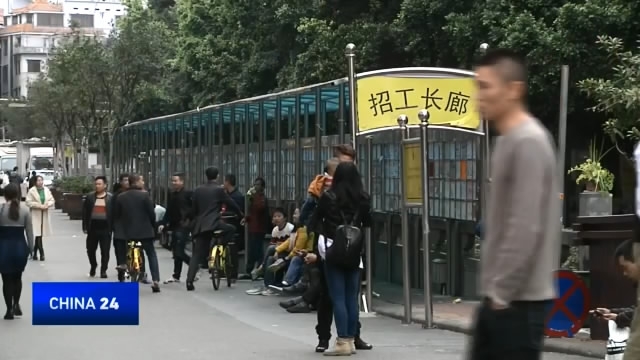
21:05, 01-Mar-2018
Talent Crunch: Labor shortage hits coastal areas after Spring Festival

China's coastal regions are dealing with a very specific kind of labor shortage. It's the one that tends to hit traditional manufacturing hubs in eastern and southern China after the Spring Festival holiday. This year has proven no different. Jiang Shaoyi tells us how employers are coping with the hiring deficit.
It's already midday in Guangzhou, a city well-known for its flourishing private businesses.
The atmosphere of the Spring Festival has not yet faded, and the streets are packed with people who come to seek workers for their companies. But this year, they are finding it harder to recruit employees, even when armed with better pay packages.
We offer a monthly salary of seven thousand to ten thousand yuan to our workers, and the benefits also include free accommodation and daily meals. Our employees work at an assembly line to make clothes, which is not a difficult task.
Though the job may not be difficult, he still has trouble finding a single employee for his business, even after sitting here all morning.
Many people come here and only look for short-term vacancies, which allows them to rest after a period of work. When the pay is not high enough, they just quit.
Other recruiters say a major reason for the labor shortage is the shifting mindset of younger workers. They say fewer people born after 1990 are willing to work in factories nowadays. And salary is not the only factor these young people consider when it comes to job-hunting.
"The recruiting season after the Spring Festival holiday has just started, so we are not in a rush to find a job."
"I just arrived here after a train journey of more than a thousand kilometers from home. I want to settle down first then consider work."
With increased development in regions farther inland, which used to be a traditional source of labor, many skilled workers nowadays are tempted to find a job closer to home.
However, business owners in Guangzhou are not giving up -- they are hoping more workers come back after the Lantern Festival. Jiang Shaoyi, CGTN.

SITEMAP
Copyright © 2018 CGTN. Beijing ICP prepared NO.16065310-3
Copyright © 2018 CGTN. Beijing ICP prepared NO.16065310-3